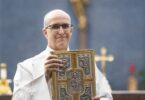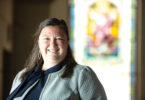
by Michael Podrebarac
We’ve now entered the last “year” of our National Eucharistic Revival. The “Year of Mission” is designed to encourage us to share the good news of salvation with everyone we encounter, rooting all our efforts in the Eucharist itself.
This is a beautiful economy of faith and witness, replicating the mission which the apostles themselves undertook following Pentecost. Our faith is compelling. Forged in the sacrament of baptism and strengthened in the sacrament of confirmation, it is renewed in fullness each time we participate in the Mass.
From there, and there alone, can it be effectively shared.
Provided, of course, that we remain committed to our baptismal promises, that we make use of those gifts of the Holy Spirit received at our confirmation, and that we live a life of eucharistic orientation, whereby the Eucharist remains for us the “summit toward which the activity of the church is directed” and the “font from which all her power flows” (Second Vatican Council).
How do we cultivate and preserve such an orientation?
We preserve it by keeping our focus upon Christ. Just like St. Peter, who could walk on the water as long as he kept his gaze upon the Lord, but began to drown once he lost his focus, so it is the same for us.
And this focus, this orientation, begins in the celebration of the Mass itself.
When one walks into any Catholic church, central to everything else is the altar. It signifies for us the sacrifice of Christ, the very sacrifice of our salvation made present during the eucharistic sacrifice of the Mass.
Complementing the altar is the ambo, where the word of God is proclaimed in the readings of the Mass.
An image of Our Lord crucified, placed near the altar, reminds us that the sacrifice of Christ is the very foundation of our divine worship, whereby we imitate him who loved us and gave himself for us (cf. Gal 2:20).
And in a fitting place is erected the tabernacle, wherein the Eucharist is reserved for the sick and, as needed, for holy Communion at Mass.
Each of these essential elements of a church remind us that everything therein is oriented “toward God” — “ad Deum” —and that our orientation during our liturgical worship, if we are to keep from sinking like St. Peter, must also be “ad Deum.” The success of his pilgrimage toward his Lord upon the waves required him to turn his attention, his orientation, “ad Deum.” Otherwise, distractions mitigated his progress.
Our work as missionary disciples begins by offering ourselves, with unmitigated focus, to God — “ad Deum” — so that he can offer us to a world in great need of good news.






